With the mind-bending pace at which artificial intelligence (AI) is changing the way we work and live, healthcare organizations are asking themselves: what do I need to know today to seize this opportunity? In this episode, experts from the World Health Organization, IDInsight, and Reach Digital Health unpack the promise and perils of AI for health.
Today’s episode is a panel discussion first recorded live at the Marmalade Festival at the Skoll World Forum in Oxford on April 12, 2024. This is the first of a 3-part podcast series on AI for Health powered by Reach Digital Health.
Our lineup includes:
Andy Pattison, Team Lead Digital Channels, World Health Organization
Debbie Rogers, CEO of Reach Digital Health
Sid Ravinutala, Director of Data Science, IDInsight
Listen now wherever you get your podcasts (Apple Podcasts, Spotify, Overcast, etc.).
Stay tuned for future episodes on our mini-series about AI for Health. In our next episode, we'll speak in greater depth with the World Health Organization (WHO), the Canadian funding agency IDRC, and the Center for the Fourth Industrial Revolution.
Connect with Africa Health Ventures
📰 Sign up for our newsletter to stay informed about what’s going on with healthcare ventures in Africa
👍 Follow us on LinkedIn
🎙️ Subscribe to this podcast
🪙 Nominate an African startup for seed funding
Show Notes
Some of the topics we cover in this panel discussion include:
The Promise
(5m09s) - Our speakers discuss the breakthroughs now possible with AI for health, including the ability to diagnose diseases years earlier than ever before; to instantaneously disseminate essential health information across languages and countries; and the ability to provide hyper-personalized care to an individual based on their needs, body, and preferences.
The Perils
(14m11s) - While it’s tempting to deploy AI systems for health as soon as possible, these also pose very real risks in the high-stakes work of medical care. AI is known to hallucinate: to make up information that has no grounding in reality; AI is deeply biased towards rich people living in the connected world; and AI has the potential to be the most persuasive - and by extension the most manipulative - technology we have ever seen.
So… What Now?
(27m02s) - What do non-profits and social enterprises need to know today to seize the opportunity? Among the many tips and suggestions shared by our speakers, Debbie’s call to action is: get stared now. If you wait two years, you’ll be another two years behind.
Q&A
(35m37s) Towards the end of this episode, our guests field real-world questions posed by the live audience in Oxford, such as how to source diverse data, how to mitigate bias, and the real risk of magnifying the digital divide.
Learn More
Ethics and Governance of Artificial Intelligence for Health highlights the ethical challenges and risks with the use of artificial intelligence of health and proposes six consensus principles to ensure AI works to the public benefit of all countries.
Ada, Reach Digital Health, and the National Department of Health in South Africa launched a collaboration to provide AI-powered medical advice to mothers across the country.
MomConnect is the South African platform to share essential health information with pregnant women across the country. It is provided by the National Department of Health in South Africa in partnership with Reach Digital Health.
This episode is a panel discussion first recorded live at the Marmalade Festival at the Skoll World Forum in Oxford on April 12, 2024. You can watch a brief highlights video of the event here.
Elicit is the AI assistant that can comb through the body of scientific papers to provide precise answers to research questions. Sid mentions Elicit as a counterexample to the significant risk of AI misinformation i.e. the ways in which AI can help societies in their search for truth.
Karya provides high-quality datasets to power AI tools which include a more balanced perspective of remote, low-network areas.

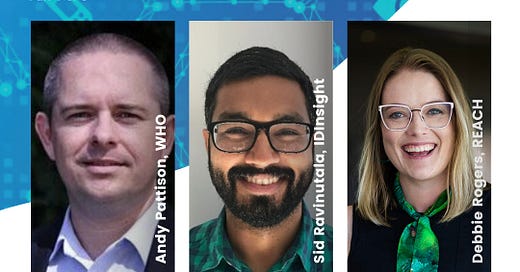



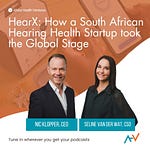



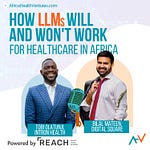
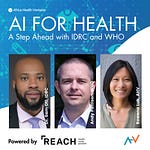
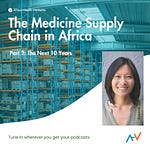
Share this post